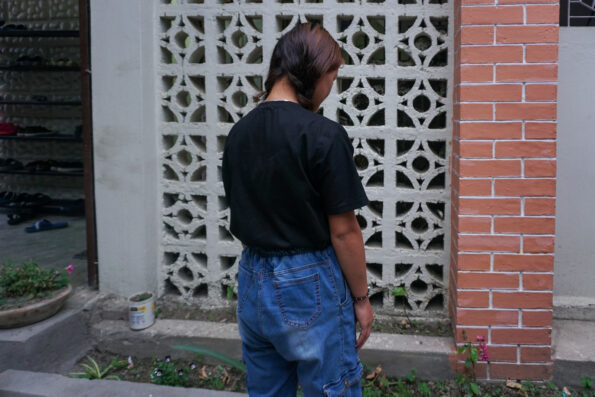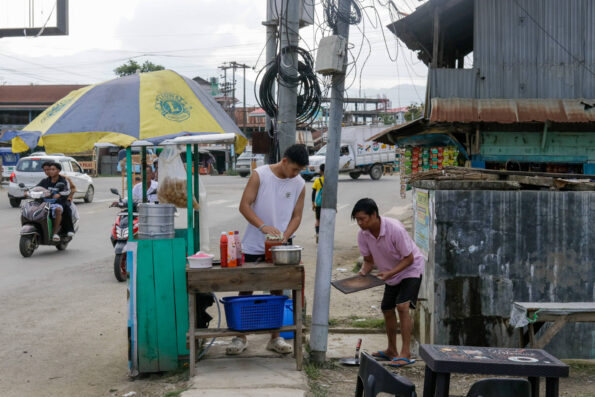
Lucila Pellettieri, GPJ Argentina
Migrants arriving in Argentina line up to complete residency paperwork at Dirección Nacional de Migraciones, the national migration office in Buenos Aires.
BUENOS AIRES, ARGENTINA — The gym of a local school is transformed into Venezuela for a few hours, as a group of entrepreneurs set up shop. With stacks of freshly cooked corn pancakes called arepas, colorful garb on display, and folk music in heavy rotation, vendors and attendees at this fair pay homage to Venezuela, a country on the northern coast of South America.
Despite the festive atmosphere, some have come with grave concerns.
The recent economic crisis in Argentina means that many Venezuelans here are struggling to send money to family members back in Venezuela, even though they moved to Argentina with hopes of finding well-paying jobs and amassing wealth, says Mario Vicenzo Pensa, president of Asociación de Venezolanos en la República Argentina, an association of Venezuelan immigrants. Pensa is also one of the organizers of the fair, which is held every two months.
Pensa left behind his siblings, a shaky economy and political unrest in 2003, when he came to Buenos Aires, Argentina’s capital.
For some, being unable to provide for family has become an emotional burden too heavy to bear, he says.



In a corner, Pensa offers counseling to Venezuelan immigrants dealing with economic hardship, while he also accepts clothing donations for them.
“It is already a lot harder to send money and think about buying a plane ticket for their aunt, grandma or whomever,” Pensa explains. “Work is also unavailable, and the money that we send covers less food.”
With Argentina’s currency rapidly depreciating and its inflation rate rising, it’s getting harder and harder for the country’s immigrants to send remittances to their countries of origin. Some 1.8 million immigrants live in Argentina, according to 2013 UNICEF data. Despite this challenge, authorities say Argentina remains a preferred destination for many immigrants. However, local immigrant organizations disagree and are advising their compatriots to examine the economic climate before they decide to settle in Argentina.
Since the beginning of the year, the Argentine peso has lost more than 50 percent of its value. In September, $1 bought around 40 pesos, more than double the 19 pesos it was worth in January.
The International Monetary Fund puts the current inflation rate at 31.8 percent, but economists say inflation has plagued Argentina’s economy for many years.
The country’s working population is paying the price. From 2015 to 2018, the minimum salary in dollars fell by 54 percent, according to a September 2018 report by Universidad Nacional de Avellaneda, a state university in Buenos Aires.
For employed Senegalese immigrants, this means two things: They can no longer send family members in their birth country as much money as they were sending some years ago, and their savings have depleted, says Ndathie Sene, a government worker and member of the Asociación De Residentes Senegaleses En Argentina, a national group of Senegalese immigrants.
“Before, if you sent 1,000 pesos (about $28), it was something interesting in Senegal,” says Sene, who emigrated from the West African country in 2007.



Remittances play a very important role for Senegalese families, who often use the money to send their children to school or to buy medication, Sene says, adding that the financial crisis is pushing people out of the country.
“Senegalese stay as long as they can work and earn some money. If not, they go,” Sene says. “Now, the number of Senegalese in Argentina has fallen a lot, because many are staying in Brazil.”
Horacio José García, director at Dirección Nacional de Migraciones, the national directorate of migration, admits that the fluctuating exchange rate makes the country less attractive to those who migrate to Argentina to help their families through remittances. But García doubts that the current economic climate prevents people from coming to Argentina, he says. Religious freedom and a strong school system are some of the things that migrants consider and look forward to when they decide to move to Argentina, he says.
“We are convinced that, for those who look to reside in this territory, it is because they include values or facts that are more important than the exchange [rate] circumstance in the balance,” García says.
Vanesa Crespo, a Venezuelan immigrant who came to Argentina in July, thinks that the country is a good choice.
“In Venezuela, I couldn’t help my parents, because if I gave to them, there wasn’t any left for me,” Crespo explains. “With the time I’ve spent here in Argentina, I have been able to help them.”
Crespo says she’s sent her parents 400 pesos ($11) within her first three weeks in Argentina.
But both Sene and Pensa are telling potential migrants that, before they travel, they should analyze the economy of the country where they plan to go.
Rishi Khalsa, GPJ, translated this article from Spanish to English.







